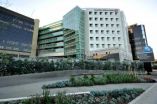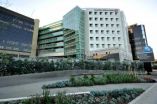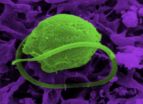(Press-News.org) Scientists at the University of Liverpool have deciphered the genetic code of wheat to help crop breeders increase yield and produce varieties that are better suited to a changing environment.
Wheat is one of the world's most important food crops, accounting for 20% of the world's calorific intake. Global wheat production, however, is under threat from climate change and an increase in demand from a growing human population.
The Liverpool team, at the University's Centre for Genomic Research, used new methods of sequencing DNA to decode the large wheat genome, which meant that scientists could achieve in one year what would have taken decades to do with previous methods. With a team of UK and international collaborators, they developed a novel way of analysing wheat's genetic information to provide breeders with the tools they need to apply the research to breeding programmes.
Funded by the Biotechnology and Biological Sciences Research Council (BBSRC) and published in the journal, Nature, the analysis of more than 90,000 genes, will help wheat breeders produce crop that are better able to cope with disease, drought and other stresses that cause crop losses.
Professor Neil Hall, from the University's Institute of Integrative Biology and lead author of the research, said: "Wheat is a large and complex genome; arguably the most complex genome to be sequenced to date. Although the genome has not been fully decoded, we now have instrumentation that can read DNA hundreds of times faster than the systems that were used to sequence the human genome.
"This technology can now be applied to other genomes previously considered to be too difficult for detailed genetic study, such as sugar cane, an important biofuel crop."
In order to understand the variations of wheat genes and their relationship to each other, scientists, in collaboration with colleagues at the Institute of Bioinformatics and Systems Biology in Germany, compared the genetic sequence to known grass genes, such as rice and barley. Partners at Cold Spring Harbor Laboratory and the University of California in the US, also compared the sequences to simpler genomes of wheat's ancestors.
This allowed the team to assemble the data in a way that scientists and plant breeders can use effectively to produce new wheat varieties that display specific traits suitable for surviving in different environments. The team worked with the John Innes Centre in identifying genetic differences between varieties, which have now been developed by scientists at the University of Bristol as landmarks in the genome to help crop breeders improve wheat grown in the UK.
Dr Anthony Hall, from the University Institute of Integrative Biology and co-author of the research, said: "Understanding wheat's genetic information and lining up its data into a form that crop breeders can use, will help develop wheat that has particular agricultural traits, such as disease resistance and drought tolerance.
"The identification of genetic markers in the genome will help breeders accelerate the wheat breeding process and integrate multiple traits in a single breeding programme. This research is contributing to ongoing work to tackle the problem of global food shortage."
Professor Douglas Kell, BBSRC Chief Executive, said: "In the face of this year's wheat crop losses, and worries over the impact on prices for consumers, this breakthrough in our understanding of the bread wheat genome could not have come at a better time. This modern strategy is a key component to supporting food security and gives breeders the tools to produce more robust varieties with higher yields."
###
Notes to editors:
1. The University is home to the Centre for Genomic Research which is a leading facility for genome sequencing, with client researchers from major companies and research institutions world-wide. The state-of-the-art new generation genome sequencing instruments is available as a service for the scientific user community. The facility is home to two Roche 454 FLX instruments and three SOLiD next generation genome analysers, which can read 10,000 million separate letters of DNA in a single day.
2. The University has established an inter-disciplinary Food Security Network to address concerns over increasing food shortages worldwide. Global food security is now an international concern with the converging impacts on human welfare of increasing population size, shortages of natural resources and climate change. The Food Security Network will investigate many of these challenges, which span all aspects of animal and crop production, disease control, nutrition and food quality, as well as land use and biofuels, and food processing.
3. The University of Liverpool is one of the UK's leading research institutions with an annual turnover of £410 million, including £150 million for research. Liverpool is ranked in the top 1% of higher education institutions worldwide and is a member of the Russell Group. Visit www.liv.ac.uk.
Liverpool scientists decipher genetic code of wheat
2012-11-29
ELSE PRESS RELEASES FROM THIS DATE:
Testicular cancer risk tripled in boys whose testes fail to descend
2012-11-29
Boys whose testes have not descended at birth—a condition known as cryptorchidism—are almost three times as likely to develop testicular cancer in later life, finds an analysis of the available evidence published online in Archives of Disease in Childhood.
The findings prompt the authors to ask whether boys with the condition should be regularly monitored to lessen the potential risk
Cryptorchidsim, where testes fail to descend into the scrotum and are retained within the abdomen, is the most common birth defect in boys, affecting around 6% of newborns.
The authors ...
Texas astronomers measure most massive, most unusual black hole using Hobby-Eberly Telescope
2012-11-29
Fort Davis, Texas — Astronomers have used the Hobby-Eberly Telescope at The University of Texas at Austin's McDonald Observatory to measure the mass of what may be the most massive black hole yet — 17 billion Suns — in galaxy NGC 1277. The unusual black hole makes up 14 percent of its galaxy's mass, rather than the usual 0.1 percent. This galaxy and several more in the same study could change theories of how black holes and galaxies form and evolve. The work will appear in the journal Nature on Nov. 29.
NGC 1277 lies 220 million light-years away in the constellation Perseus. ...
Ponatinib acts against the most resistant types of chronic myeloid leukemia
2012-11-29
HOUSTON – A previously invincible mutation in chronic myeloid leukemia (CML) has been thwarted by an investigational drug in a phase I clinical trial reported in the current edition of The New England Journal of Medicine.
All 12 patients in the trial with chronic phase CML and the T315I mutation had a complete hematologic response (absence of CML cells in the blood) after treatment with ponatinib. Eleven had a major reduction in CML cells in the bone marrow and nine achieved a complete cytogenetic response – no cells in the marrow.
T315I is present in up to 20 percent ...
In Cedars-Sinai study, common drug reverses common effect of Becker muscular dystrophy
2012-11-29
LOS ANGELES (Nov. 28, 2012) – Cedars-Sinai Heart Institute researchers have found in an initial clinical trial that a drug typically prescribed for erectile dysfunction or pulmonary hypertension restores blood flow to oxygen-starved muscles in patients with a type of muscular dystrophy that affects males, typically starting in childhood or adolescence.
Tadalafil, commonly known by brand names Cialis and Adcirca, reversed the effects of a biochemical chain of events that in Becker muscular dystrophy deprives muscles of an important chemical, nitric oxide, which normally ...
New practices reduce surgical site infections after colorectal surgery
2012-11-29
LOS ANGELES — EMBARGOED UNTIL 1 P.M. EST ON WEDS. NOV. 28, 2012 – Surgical teams at Cedars-Sinai have reduced surgical site infections by more than 60 percent for patients who undergo colorectal procedures by introducing evidence-based protocols that are easy to follow and relatively low in cost.
Surgeons, nurses, operating room staff and patients all collaborated in a quality improvement project that measured surgical site infection rates from March 2011 to March 2012. Several new steps were introduced to guard against infections, and these have now been expanded and ...
Algae held captive and genes stolen in crime of evolution
2012-11-29
Microscopic animals held algae captive and stole their genes for energy production, thereby evolving into a new and more powerful species many millions of years ago reveals a new study published today in the journal Nature.
The results reveal a 'missing link' in evolution because the tiny animal thieves (protozoa) couldn't completely hide all evidence of the captive algae, and have been effectively frozen in time and caught in the act by genetic sequencing.
The protozoa captured genes for photosynthesis- the process of harnessing light to produce energy which is used ...
Autumn sets in rapidly on Saturn's giant moon
2012-11-29
Thanks to NASA's Cassini spacecraft which has been orbiting Saturn since 2004, scientists have been able to observe for the first time ever the seasonal atmospheric circulation direction change on Titan – an event which only happens once every 15 years and is never observable from Earth. Their findings are published today in Nature.
Titan, while technically only a moon, is bigger than the planet Mercury, and is often considered a planet in its own right. It is the only known moon to have a significant atmosphere and is one of only four terrestrial atmospheres in our ...
Scientists develop new approach to support future climate projections
2012-11-29
Scientists have developed a new approach for evaluating past climate sensitivity data to help improve comparison with estimates of long-term climate projections developed by the Intergovernmental Panel on Climate Change (IPCC).
The sensitivity of global temperature to changes in the Earth's radiation balance (climate sensitivity) is a key factor for understanding past natural climate changes as well as potential future climate change.
Many palaeoclimate studies have measured natural climate changes to calculate climate sensitivity, but a lack of consistent methodologies ...
Health-care providers can play critical role in reducing and preventing intimate partner violence
2012-11-29
(Boston) – In a perspective article to appear in the Nov. 29 issue of the New England Journal of Medicine, researchers from Boston University Schools of Medicine and Public Health (BUSM and BUSPH) report that health-care providers can play a critical role in helping to reduce and prevent intimate partner violence (IPV) by screening and referring patients to appropriate resources.
The U.S. Centers for Disease Control and Prevention recently released a comprehensive report on the prevalence of sexual violence, stalking and IPV in the U.S. The report relays the alarming ...
Voter polls portend conflict between Obama administration and Republican leaders over ACA
2012-11-29
Boston, MA – An analysis of newly released polls shows that most of those who voted for President Obama in the 2012 election favor implementing the Affordable Care Act (ACA) and want the federal government to continue efforts to make sure most Americans have health insurance coverage. However, at the same time the President was re-elected, Republicans maintained a majority in the U.S. House of Representatives, and 30 of the nation's 50 states will have Republican governors. The polls suggest that those who voted for these Republican officeholders, and therefore many of ...



